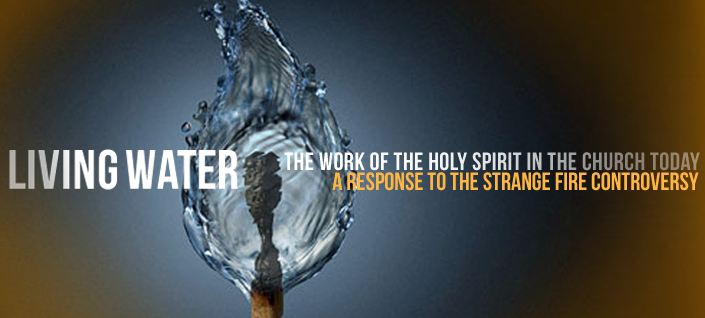
There is a pretty large separation among Christians today, dividing them among those who believe that God still gives unto His people the more miraculous gifts of the Holy Spirit, and those who believe God stopped giving those gifts in the first century of the Church. This separation has been around a long time – before the rise of Pentecostalism and the Charismatic movement. Yet those 20th century movements brought a lot of attention to this difference of opinion among Christians.
The disagreement is between those who believe that many of the gifts of the Holy Spirit (often referred to in the New Testament) ceased with the end of the apostolic age, and those who believe the Holy Spirit continues to give those gifts to the present day. That sentence oversimplifies the debate and does not speak to many variations of position, but I think it is a fair (if overly simple) summary.
Last year (2013) Dr. John MacArthur and Grace Community Church hosted a conference they called Strange Fire, to coincide with a book by MacArthur with that same title. The conference and the book brought some new energy to this long-standing disagreement in the Christian world.
In this debate, I’m a definite continualist – believing the Holy Spirit continues to give these gifts to God’s people, distributing them as He wills. I believe in charisma, not charismania, and still think that Chuck Smith’s book Charisma versus Charismania is one of the best short, popular works on the subject. I believe that what are often thought of as more miraculous gifts of the Holy Spirit are for today, but should not be made the center of congregational life. Instead, worship, the Word of God, and love for one another should be the center of congregational life.
Because of this I fundamentally disagree with Dr. John MacArthur’s understanding of spiritual gifts among God’s people today. These aren’t new teachings from Dr. MacArthur; every 10 years or so he seems to come out with another book against spiritual gifts and those who believe they are for today. At the same time it’s important to say that much that happens under the banner of Pentecostalism or the charismatic movement is foolish, dangerous, and indefensible. There is nothing wrong with Dr. MacArthur and his associates calling attention to the foolish, dangerous, and indefensible.
Nevertheless – that is, despite the extremes of charismania and cessationism – our thinking about the gifts of the Holy Spirit and their place in the church today should be shaped by the Bible. Without defending those guilty of charismania, I’m happy to defend the Biblical truth that the gifts of the Holy Spirit, including the miraculous ones, are available to God’s people in the present day as explained by the Scriptures themselves.
I believe our cessationist brothers and sisters are wrong. I don’t believe they are unspiritual or fundamentally dishonest. I know that some in the continualist camp hold their cessationist brethren in low regard, and I know that many in the cessationist camp regard those with my beliefs with scorn and sometimes contempt.
Despite the scorn that is sometimes directed towards those who believe such gifts continue, I genuinely love our cessationist brothers and sisters. I don’t think they are stupid or unspiritual, even though I think they are wrong. In my view, the reasons for the differences are mainly based on several wrong premises. I don’t agree with these cessationist premises, so I don’t agree with the conclusions that come from them.
Understanding the Question
The simple question “Do the gifts of the Holy Spirit continue today?” sometimes has a complicated answer. There is a sense in which all Christians agree that they continue today, and there is a sense in which most all Christians agree that not everything continues as it did in the days of the Apostles.
When we look at the gifts of the Holy Spirit as they are described in the New Testament, we see several different lists.
• Romans 12:6-8 mentions the gifts of prophecy, ministry, teaching, exhortation, giving, leading, and showing mercy.
• Ephesians 4:7-8 and 4:11 speak of the gifts (or perhaps offices) of apostles, prophets, evangelists, and pastor-teachers.
• 1 Peter 4:10-11 tells of the gifts of speaking and ministering (serving).
• 1 Corinthians 12:4-11 describes the gifts of the word of wisdom, the word of knowledge, faith, healings, miracles, prophecy, discerning of spirits, tongues, and interpretation of tongues.
Most of these gifts of the Holy Spirit are not controversial. I don’t know of any who argue today that the Holy Spirit does not give the gift of teaching, the gift of speaking, the gift of evangelism, the gift of giving, and so on. Virtually all Bible-believing Christians believe that some of these gifts are for today, but some believe that some of them are not for today.
More accurately, the question is: “Are all of the gifts of the Holy Spirit for today? Are some of them no longer given by God?” I believe the answer to that question is “Yes, all the gifts of the Holy Spirit are for today,” with one important qualification. The qualification is to understand that there was a foundational role that the apostles and prophets of the New Testament era had in bringing forth the New Testament Scriptures. This authoritative, foundational role is mentioned in Ephesians 2:20, speaking of the Church, the household of God:
Having been built on the foundation of the apostles and prophets, Jesus Christ Himself being the chief cornerstone.
That foundation is already set upon the authority of Jesus Christ and the apostles and prophets that brought us the New Testament. We may say that there are apostles and prophets through the history of the church in a sense, but not with the same authority to set the foundation as described in Ephesians 2:20.
Apart from that one qualification, what reason to we have to believe that the miraculous or supernatural gifts of the Holy Spirit continue to the present day? We believe it because this is what the Bible teaches.
What the Bible Teaches About the Continuation of the Gifts
Acts 2:33, and 2:39 speak of the promise of the Holy Spirit – specifically including miraculous gifts – as a promise made to all generations.
Therefore being exalted to the right hand of God, and having received from the Father the promise of the Holy Spirit, He poured out this which you now see and hear . . . For the promise is to you and to your children, and to all who are afar off, as many as the Lord our God will call.
Peter’s explained the strange and miraculous phenomenon the audience at Pentecost saw from the disciples that were filled with the Holy Spirit. He explained it as the promise of the Holy Spirit, poured out upon His people, and that the promise was for generations to come (you and your children, and to all who afar off). There isn’t a hint that the supernatural nature of this outpouring had an expiration date.
1 Corinthians 14:12 and 14:26 tell us that the purpose for spiritual gifts – even miraculous gifts – is the building up of the body of Christ and individual Christians:
Even so you, since you are zealous for spiritual gifts, let it be for the edification of the church that you seek to excel . . . How is it then, brethren? Whenever you come together, each of you has a psalm, has a teaching, has a tongue, has a revelation, has an interpretation. Let all things be done for edification.
These many centuries later, God’s people have no less need to be edified (build up and made strong).
We also have the promise of Mark 16:17-18. Some people avoid this passage because there is some textual dispute as to if it was actually written by Mark or if it was added later. I think I understand the dispute and debate; yet the overwhelming majority of ancient manuscripts contain the passage, and many very early Christian writers referred to Mark 16:9-20 in their writings. Early Christians knew about this passage and accepted it as genuine. Mark 16:17-18 says:
And these signs will follow those who believe: In My name they will cast out demons; they will speak with new tongues they will take up serpents; and if they drink anything deadly, it will by no means hurt them; they will lay hands on the sick, and they will recover.
This is a simple and straightforward promise, in context, given to those who are involved in spreading the gospel – they will be unstoppable, and God will even use miraculous means to protect them and make them effective. Jesus gave no expiration date or time limit to this promise.
The natural, consistent testimony of the New Testament is that the miraculous gifts described in the New Testament have not expired or been retracted. It’s difficult to see how anyone, with a fresh reading of the Scriptures could ever come to such an understanding. There is no indication that miraculous gifts would die out when the apostles died out. There is no distinction made between “sign gifts” and other gifts in the New Testament; they come always and only as a package.






